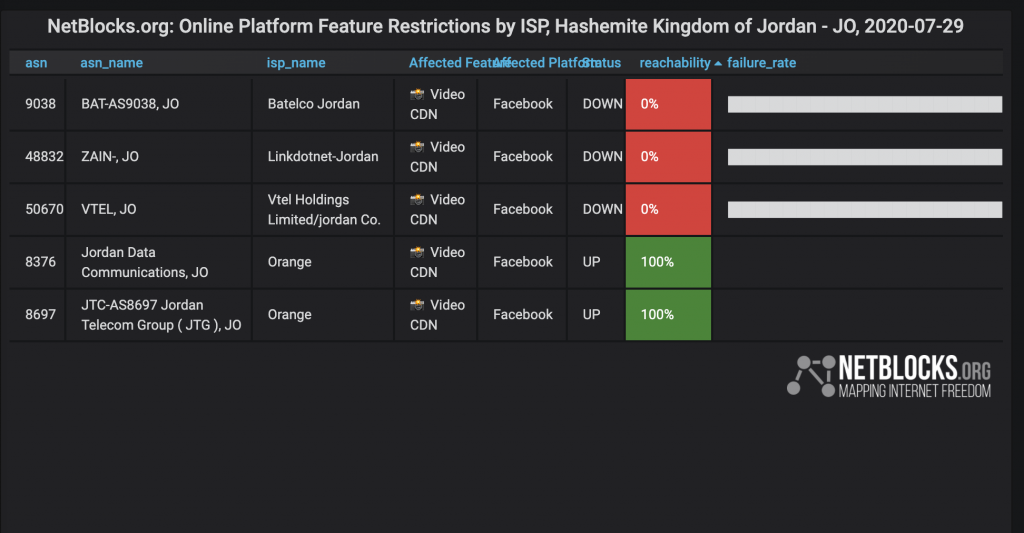Network data from the NetBlocks internet observatory confirm that Facebook Live video streaming features have been restricted in Jordan on multiple providers on Wednesday 29 July 2020. Real-time metrics show that the feature was restored some hours later.
The restrictions came into place on Wednesday amid protests against the closure of Jordan’s teachers’ syndicate, during which a number of participants were arrested. Authorities also imposed a gag order, preventing local media from reporting on events and limiting online speech.
Update: Facebook Live streaming servers have again been restricted on Monday 3 August 2020, 5:30 p.m, and at similar times on Tuesday and Wednesday. The follow-up restrictions came as authorities reportedly close off streets to limit demonstrations which have nevertheless continued. Further incidents have been recorded as protests have flared up in the following days.
Update: Facebook Live streaming / video CDN servers have again been temporarily restricted in #Jordan amid late evening Teachers' Union protests in Jerash, as a state gag order continues to prevent news coverage ??
? https://t.co/888sVWOyUk pic.twitter.com/57lu6nNwdo
— NetBlocks (@netblocks) August 19, 2020
Update: Facebook video CDN servers have again been restricted in #Jordan as late-night Teachers' Union protests flare up in Karak amid reports of arrests ?
? https://t.co/888sVWOyUk pic.twitter.com/55VhzjAmnl
— NetBlocks (@netblocks) August 16, 2020
Update: Facebook video CDN servers are again restricted in #Jordan amid a new wave of Teachers' Union protests in #Amman and #Irbid scheduled to continue through the coming week; the disruptions typically come into effect on protest evenings ?⏱
? https://t.co/888sVWOyUk pic.twitter.com/YQqDIwZcYb
— NetBlocks (@netblocks) August 9, 2020
Facebook video backend servers are again restricted in #Jordan as Teachers' Union protests continue in #Amman and #Karak.
Real-time network data from the last 3 days show a curfew-style schedule of disruption affecting multiple internet providers ⏱
? https://t.co/888sVWOyUk pic.twitter.com/EunayeMd9e
— NetBlocks (@netblocks) August 5, 2020
Update: Facebook video CDN restrictions are back in place in #Jordan amid ongoing Teachers' Union protests; real-time network data show multiple providers affected limiting access to specific features on the popular social media platform ?
? https://t.co/888sVWOyUk pic.twitter.com/gpnqkwb05d
— NetBlocks (@netblocks) August 4, 2020
⚠️ Confirmed: Facebook Live CDN servers have again been blocked by multiple operators in #Jordan.
The Internet restrictions vary by provider and come despite the cancellation of tonight's Teachers' Syndicate protests; see live report for updates ?
? https://t.co/888sVWOyUk pic.twitter.com/uvDHJmE1r3
— NetBlocks (@netblocks) August 3, 2020
Confirmed: Facebook Live CDN servers are currently blocked by multiple operators in #Jordan. The restrictions vary by provider and may impact internet users' ability to stream videos using the service during Teachers' Union protests; incident ongoing ? pic.twitter.com/qppIK2s2y9
— NetBlocks (@netblocks) July 29, 2020
Affected users were are to regain access via VPN services which circumvent internet censorship by tunnelling to other countries. No court order or lawful basis has been presented by authorities or operators at the time of writing.
5000 Internet performance metrics collected from 100 observation points and a wider set of analytics data confirmed that Facebook video CDN backend servers were restricted in Jordan and provided a timeline for the disruptions.
Which countries use targeted platform restrictions?
Jordan has a comparatively free and open internet, hence the restrictions can been seen as a setback for media freedom and fundamental rights in the kingdom. Similar restrictions appear in NetBlocks data sets during previous moments of political significance and investigations are ongoing into their purpose and intent.
As governments typically block entire platforms during unrest, targeted restrictions of specific features are rare but not unprecedented at global scale. NetBlocks previously documented targeted feature restrictions in May 2019, when Indonesia targeted Twitter upload servers preventing users from posting photos and videos without a VPN.
In that incident, the policy of restricting authentic content from protest locations appeared to contribute to the spread of misinformation because users resorted to sharing outdated or mis-located video clips.
NetBlocks advises that network operators and authorities refrain from using network disruptions to limit citizens’ rights to free expression and free assembly.
Additional incidents
15 March 2021: Restriction of Facebook video servers amid anti-curfew protests
⚠️ Confirmed: Facebook video CDN services restricted on multiple internet providers in #Jordan amid anti-curfew protests after Covid patients die due to oxygen shortages; restrictions consistent with previous disruptions during protests ?
? Previously: https://t.co/888sVWOyUk pic.twitter.com/c6qHKAnnWp
— NetBlocks (@netblocks) March 15, 2021
Further reading:
- Jordan bans coverage of teachers’ protests – Reporters Without Borders
- Jordan: Arrests, Forced Dispersal at Teacher Protests – HRW
- Teachers in Jordan are asking for fair pay – The New Arab
Methodology
Internet performance and service reachability are determined via NetBlocks web probe privacy-preserving analytics. Each measurement consists of latency round trip time, outage type and autonomous system number aggregated in real-time to assess service availability and latency in a given country. Network providers and locations are enumerated as vantage point pairs. The root cause of a service outage may be additionally corroborated by means of traffic analysis and manual testing as detailed in the report.
NetBlocks is an internet monitor working at the intersection of digital rights, cyber-security and internet governance. Independent and non-partisan, NetBlocks strives to deliver a fair and inclusive digital future for all.
[ press | contact ] Graphics and visualizations are provided for fair use in unaltered form reflecting the meaning and intent in which they were published, with clear credit and source attribution to NetBlocks. Intellectual property rights are protected including but not limited to key findings, facts and figures, trademarks, copyrights, and original reporting, are held by NetBlocks. Citation and source attribution are required at the point of use.

